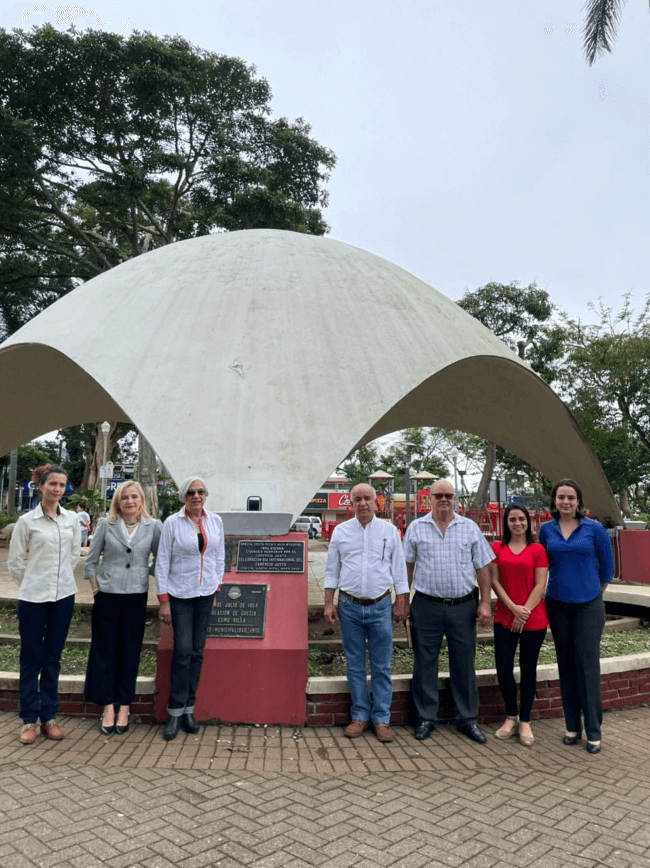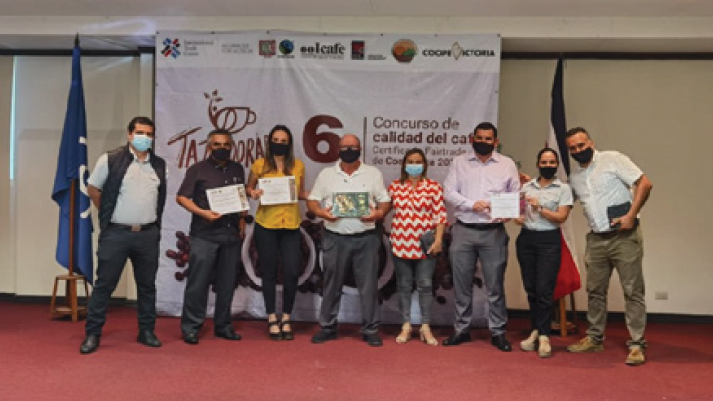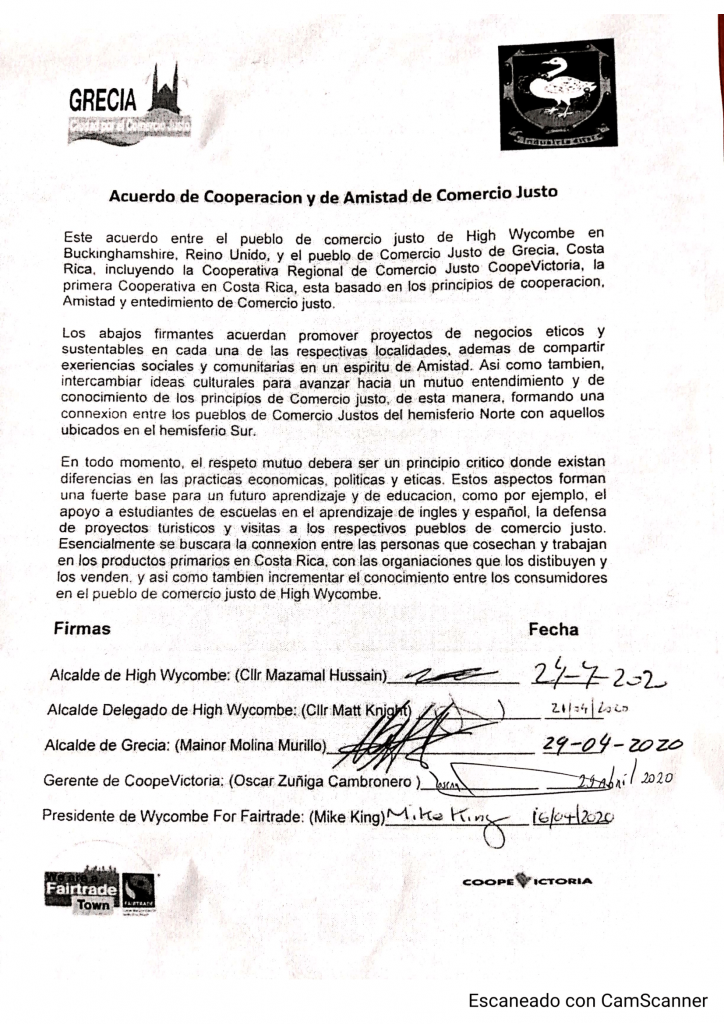Attended by Mike and Sheena King from Wycombe for Fairtrade. (Only UK Fairtrade Town present)
Mike and Sheena King flew to Switzerland 4 days before the Conference for a short holiday, staying in the Alpine village of Filzback, overlooking the Glarus Valley. Stunning mountain scenery, alpine flower meadows, fresh air, a local chair lift, the sound of cowbells, all made for an enjoyable break.
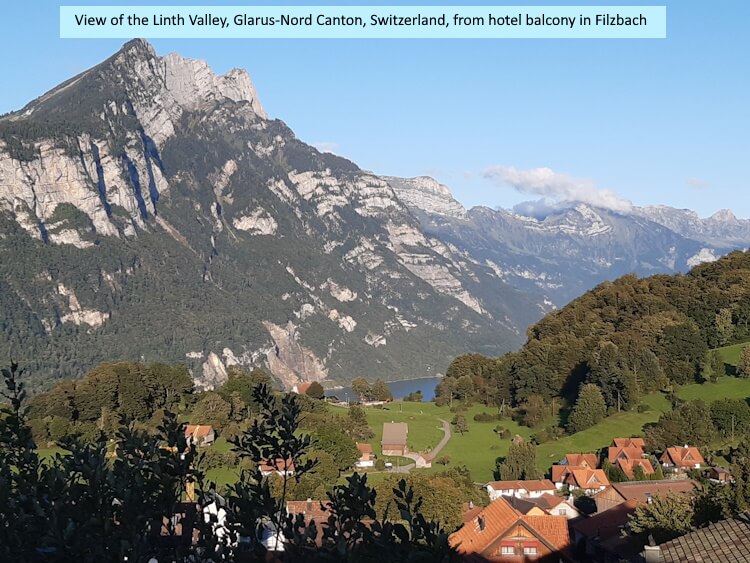
IFTTC – Day 1 – Friday 22nd September 2023- Morning – Overview.
The IFTTC began with an early 40-kilometer coach trip to the Fairtrade Town of Vaduz, the capital of neighbouring Liechtenstein. Welcomed by the Mayor, the first plenary session and expert panel discussion focused on “Localizing Fair Trade”. Liechtenstein recognized the importance of supporting both tropical products and Fair Trade farmers, but also assisting local producers equally. Vaduz had produced a very useful town map with locations of Fair Trade outlets ass well as independent shops and markets selling locally produced food. Their mantra is “Local and Fair”. Combining Fair Trade sugar with locally grown wheat and maize, Liechtenstein had produced a very nice Fair Trade Beer, which we received as part of our lunch packs. There was also a trip by road train, cut short by the heavy rain, of their “World fields” project. The idea was to grow by organic means arable crops, buckwheat, rice, Ribel maize, and soya, on a 2000 square meter plot to calculate the amount of land needed to support one person. The intention is also to increase biodiversity.

Expert Panel discussions focused on exploring ideas and examples of increasing: –
- South – South Fair trade – spurred on by the Covid pandemic when Northern exports were interrupted or halted.
and
- North – North fair trade – applying Fairtrade principles to the poorest dairy farmers and wheat growers (France), blueberry growers, (Finland) and small – scale tomato growers (Southern Italy) – all on Fairtrade Terms. Discussion around a Northern Fairtrade logo.

Afternoon – Overview
We arrived at the Lintharena, the main Conference venue on the outskirts of Nafels, in the Glarus Valley.
Welcome and Keynote Speech
2.00 pm The Mayor of Glarus – Nord Canton, totally Fairtrade, welcomed Conference delegates from all over the world. Glarus Nord became a Fair-Trade Zone in 2016. He stressed that Glarus Nord had proved that local businesses and the community can work together to make a sustainable contribution to the fight against worldwide poverty. Glarus has a long history in supporting and legislating for positive social changes, e.g. 1846 bill prohibiting child employment, 1848 bill prohibiting Sunday opening, 1916, the local General Assembly approved the first old age pension scheme in Switzerland. Over 2000 Fairtrade products are now available in Switzerland.
The Impact and Innovation of Fair Trade – 5 Speakers from Fair Trade projects around the world.
Maz Havelaar – Switzerland – Please see separate report.
Get Paper Industry – Fairtrade Paper Project – Nepal – Please see separate report.
Cotton – Pravakar Meher – Please see separate report.
Tropical Almonds Project – Telmond Foods – Ghana – Dr. Eva Aganda – very innovative and fascinating – Please see separate report.
Fair Picture – Jorg Arnold – Breaking down stereotypical views of underdevelopment, poverty, backwardness of the global South. Please see separate report.
3.45 pm. Fair Public Procurement – Judge Marc Steiner
This Swiss Federal Judge gave a fascinating insight into the changes in Public Procurement since the World Trade Organization Government Procurement Agreement. The EU now recognizes that member states public procurement policies should incorporate sustainable, ecological, environmental, and socio-economic aspects. Public procurement in the European Union alone is worth a staggering 2.5 trillion euros per year. For further details please see the separate report.
4.25pm Global South Spotlight – 3 speakers
1. Get Paper Industry – Nepal – Milan
Milan stressed that Global South producers need a voice with full human rights for workers. The Get Paper Industry, based in Kathmandu, Nepal, is a social Fairtrade certified enterprise, producing handmade paper and stationery, making paper the old way using cotton rags as the raw material, with the paper formed by drying in the sun. Paper, paper bags, cards, and decorative boxes are produced, largely by a female workforce. Priority objectives include: –
- Employment of formerly marginalized women
- Empowerment of women in the business including management roles
- Provide full training, education, and health facilities.
- Sustainable employment
Please view Global South Spotlight report for full review.

2. WeltPartner, Germany, Fairtrade Importer and Wholesaler – Thomas Hoyer. MD.
Thomas Hoyer stressed that social businesses like Get Paper Industry have increased their social impact as well as their business development. WeltPartner has around 60 Fairtrade partners worldwide accounting for over 1500 products, 93% of which are food products. They pride themselves on working only with smaller Fairtrade Cooperatives, getting the highest (fairest) prices possible, developing strong and lasting relationships with producers such as Get paper Industry.
Please view Global South Spotlight report for full review.
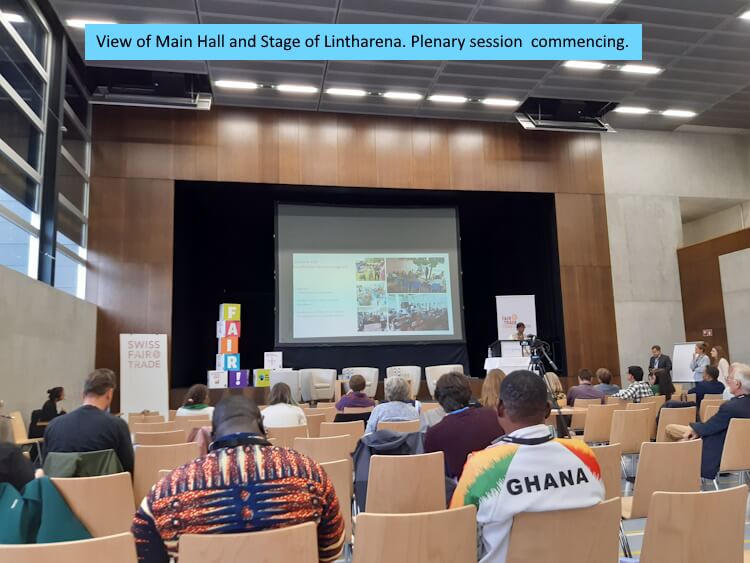
3. Tropical Almonds – Dr. Eva Aganda, Extension Services Manager, Telmond Foods,
With the tropical almond, Talmond Foods are introducing a novel, protein-rich food to the plant-based movement whose nutritional benefits are almost identical to those of the conventional almond, however, much more environmentally friendly. The milk from this Fairtrade certified product was initially aimed at the local population, then regionally, and finally internationally. Dr Agana stated that this new industry supported diversification away from traditionally grown products like bananas, cocoa, and palm oil. Talmond have recognized their local and regional customers too in this South – South trading pattern.
IFTTC – Day 2 – Saturday 23rd September 2023- Morning – Overview.
This was a busy full day with plenary sessions, expert panel discussions and workshops.
International Campaigns Updates & Strategies. Sat 23rd September 9.00 am. To 10.00 am.
Jonathan Janssens, Gent Fair Trade Region, Belgium.
Jonathan recognized that the secret to getting things done was to identify the: –
- Right people
- Right organization
- And the right politician
- Find out where their interests lie and in turn inform them of the principles of Fair Trade
Fair Trade Town Coordinator. Takashi Kobuki, Japan.
It was common in Japan with Fair Trade Town campaigns to use celebrities, famous athletes, professional footballers with links to a particular town. Famous sportsmen, sportswomen, and media personalities would have their own fan base, which could be influential by spreading the word.
Fleurance Laroppe, Saarbrucken Fair Trade Town, Germany.
Fleurance echoed the approach of the first speaker, Jonathan Janssens from Ghent Fair Trade. Saarbrucken was the first Fair Trade Town in Germany. Fleurance gave a very enthusiastic and energetic talk highlighting the need to: –
- Look for the people who make decisions.
- Identify cross-generational influencers and policy makers.
- Look across different cultures and identify successful advocates and campaigns.
- Identify organizations with good resources like schools, universities, businesses.
- Look for sponsorship or backing – No campaign can run without a budget.
Local University Schemes
There is a 10-year scheme running in local universities where interested students are paid to become Fair Trade Ambassadors to devise and deliver campaigns like “Fair For Fair”. However, in this post-Covid environment and cost of living rises, some universities are naturally cutting back on their pool of Fair Trade Ambassadors but are still retaining their “Fair Trade Plus” project. It is hoped that these paid, part-time, young ambassadors will become Full-time activists within the Saarbrucken Municipality. Their training as ambassadors would give them a good insight into how Fairtrade operates and how local Fair Trade Town activists can make a difference.
Rex Asanga, Managing Chief Executive Officer, Bolgotanga Region, Ghana.
There is an annual regional Fair-Trade Festival and Fair with small-scale farmers, medium-sized producers, and local tribal chiefs all serve on the Fair Trade planning committee. These key actors are the major stakeholders. They try to find sponsorship and exhibitors for this annual festival which these farmers and producers really value as an arena and showcase for their products.
Stakeholder Activation in the Fair-Trade Movement. Sat 23rd Sept 2023. 10.00 am. to 10.45 am.
Bianca De Wolf, Flanders Fair Trade, Belgium.
Biance de Wolf gave an interesting and detailed overview of the state of Fairtrade in Belgium. There are around 193 Fairtrade Towns in Belgium, shared between Flanders and the Dutch speaking part of Wallonia in Northern Belgium. The first Fairtrade town in Belgium was Ghent, certified in 2006.
The annual Fair Municipalities Meeting Day brings together everyone involved in the campaign to discover, inspire, network, and look ahead. The meeting intends to offer fresh ideas, new insights, and concrete examples to rejuvenate, expand, renew, or connect the local campaign with other sustainability themes in the fair municipality or city. And there is plenty of time and space to network with each other!
Young and older committed volunteers, members of the council of aldermen, civil servants: everyone will find something to their liking here.
Fair Trade Flanders did a SWOT analysis of Stakeholder needs and aims revealing
4 main findings: –
- Connecting with other Fair Trade Towns in Flanders
- Broadening Fairness
- Rejuvenating Steering Groups who were all ageing with younger people.
- Renew approach with animated and real “Fair Trade Town Tours Tours” with Fairtrade prizes.
Stakeholder Activation Expert Panel Session.
(Bianca De Wolf, Flanders Fair Trade; Giorgio Dal Fiume, WFTO, Italy; Jonathan Janssens, Ghent Fair Trade; Takashi Kobuki, Fair Trade Forum, Japan; Fleurance Laroppe, Fair Trade Saarbrucken; Jatta Makkula, National Coordinator Finland.
Expert Panel Conclusions: –
- It is not easy to invent something new or introduce a new approach
- Public procurement covers a wide area in addition to food. Fairtrade producers make handicrafts, textiles, clothes, paper, cosmetics, gardening gloves etc.
- There are always new actors/stakeholders that may want to be involved, especially in new sustainable and ethical areas.
- Create and share a joint vision with other stakeholders.
- Form alliances with sustainability, environmental, ecological, and local business groups.
- Always seek to engage and incorporate young people into discussions and plans, listening to their ideas and views.
Local Campaigning Roadmap – Workshop, Main Lintharena. 11.15 am to 12.30 pm.
Speakers and workshop focused on Fair Trade Network across Europe, Asia and the Pacific region, as well as Africa. The session looked at best practice, ideas, and challenges faced by local campaigning groups.
Speakers and workshop attendees agreed that local campaigns must be: –
- Fun and enjoyable – Fair Trade Wales has an online resources and practical help section to assist the 30 Fairtrade Groups operating in Wales.
- Engagement with the public – this will vary according to different stakeholder groups. Local or national government political support is very useful to have.
- Inclusive – especially significant engagement involving young people across a range of sectors including schools and colleges.
- Utilize resources available from sponsors, local authorities, schools, and colleges, as well as the online resources of the UK Fairtrade Foundation itself.
- Promoting Fairtrade products and logo. 93% of UK consumers are thought to recognize and trust the logo knowing that farmers will get a fair price for their purchases. Fair Trade challenges the existing sub-optimal free market trade conditions and associated social and economic inequalities.
- Local Fairtrade campaigns should also make connections that Fairtrade champions: –
– gender equality
– female empowerment
– sustainable farming practices
– organic production
– reforestation
– measures that mitigate climate change.
Youth Driving Fair Trade. Plenary Session. Sat 23rd September 2.00 pm.
Lisbeth Perez, Commercial Manager at Maquita Productores, Ecuador. Online
Lisbeth sited examples of young women becoming involved in Fairtrade cocoa production. Fairtrade has been instrumental in women acquiring and developing skills to obtain management and leadership roles in cocoa cooperatives in addition to working in community development projects like clean water, community health, and education. This has boosted the self-esteem of women and improved their basic human rights.
The Board of the company try to keep spaces and jobs for youth to learn by doing and to encourage Fairtrade advocates by: –
- Instigating training programmes for young people who want to learn.
- To reserve spaces for youth to gather and to encourage them to be “community minded”.
- Allow youth to be advocates of their own projects e.g., an affordability programme to transition to a greener approach for food production.
- Include youth in policy making and decisions.
Youth are welcomed in Fair Trade Town movements in Ecuador as they are the future.
Youth Driving Fair Trade. Panel Discussion. Main Lintharena. 2.00 pm to 3.00 pm.
Panel Members:
Simon – Fair Trade Advocacy Office – Brussels
Mayqueen – FairAfric – Ghana
Mayqueen focused on Africa’s Share in the Global Chocolate industry.
Many chocolate brands with the Fairtrade label provide a high incentive to cocoa farmers. However, many farmers have large families, so when children come to inherit their families land, the parcels of land grow smaller and farm size decreases. FairAfric pays around $2400.00 per tonne of raw cocoa. If this cocoa was processed into chocolate to add value, the price per tonne would increase to $10,000.00.
The price must be fair to the consumer as well as to the producer who grew the cocoa.
Simon thought that environmental and sustainable production needed to expand by investing in: –
- Biodegradable packaging and wrappers.
- Solar energy
- Climate neutral
- Reforestation schemes to improve soil fertility and retain water.
- Totally Organic production (this requires a higher premium to be paid to farmers)
- Create more cocoa production jobs in Ghana with gender equality built in.
- Create truly sustainable cocoa farming.
- Add new products.
- Retain greater control of cocoa production at source.
- Sell more Fairtrade cocoa to Fairtrade Chocolate companies like CLARO Fair Trade.
In 1997 the Claro fair trade cooperative was transformed into an Aktiengesellschaft according to the Swiss law. claro fair trade claims as ultimate goals the continuous improvement of the social, economic, and environmental situation of their producers. These include the minimization of middlemen in favour of direct cooperation with local partners and supporting social projects. Whenever possible, the products are certified by the Max Havelaar Foundation. This Business to Business direct transaction is becoming more popular.








